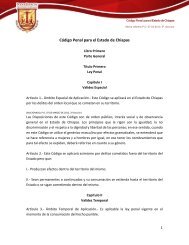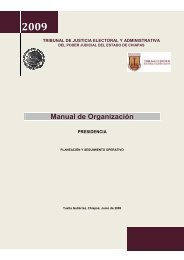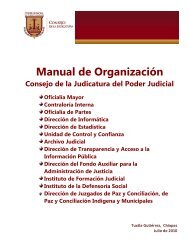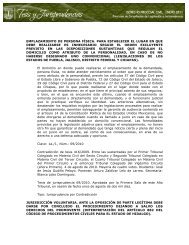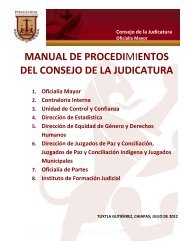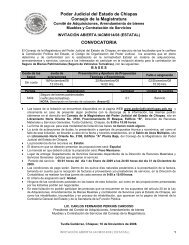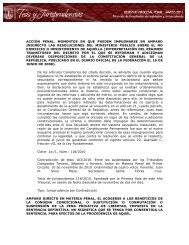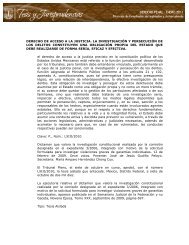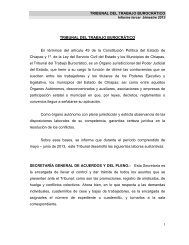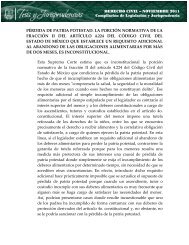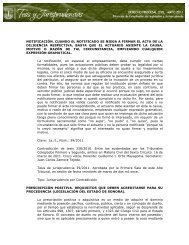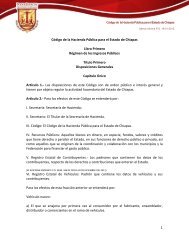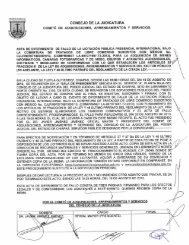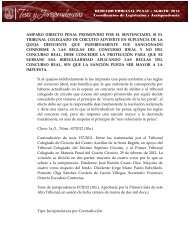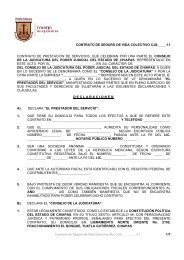DERECHO CIVIL â AGOSTO 2012 Coordinación de Legislación y ...
DERECHO CIVIL â AGOSTO 2012 Coordinación de Legislación y ...
DERECHO CIVIL â AGOSTO 2012 Coordinación de Legislación y ...
Create successful ePaper yourself
Turn your PDF publications into a flip-book with our unique Google optimized e-Paper software.
<strong>DERECHO</strong> <strong>CIVIL</strong> – <strong>AGOSTO</strong> <strong>2012</strong><br />
Coordinación <strong>de</strong> Legislación y Jurispru<strong>de</strong>ncia<br />
para hacer efectivo aquél, se proce<strong>de</strong> a su valuación y remate respectivo,<br />
para que con el dinero habido se le cubra el importe <strong>de</strong>l crédito, o bien, se le<br />
adjudique por remate. Cuando se embarga dinero o se está en los casos<br />
análogos, como el embargo <strong>de</strong> una cuenta bancaria, se trata <strong>de</strong> un bien que<br />
pue<strong>de</strong> entregarse inmediatamente al ejecutante porque no hay ningún otro<br />
trámite que hacer, más que la simple entrega a través <strong>de</strong>l endoso <strong>de</strong>l billete<br />
<strong>de</strong> <strong>de</strong>pósito respectivo, que implica que el dinero ya salió <strong>de</strong>l patrimonio <strong>de</strong>l<br />
ejecutado a través <strong>de</strong> un acto <strong>de</strong>l banco que se traduce en el cumplimiento<br />
<strong>de</strong> una or<strong>de</strong>n judicial previamente emitida. Por tanto, en este caso, entregar<br />
inmediatamente el dinero a través, en su caso <strong>de</strong>l endoso <strong>de</strong>l billete <strong>de</strong><br />
<strong>de</strong>pósito respectivo, supone un acto <strong>de</strong> traslado <strong>de</strong>l dinero a favor <strong>de</strong>l<br />
ejecutante que se verifica con la puesta a su disposición; pero el dinero salió<br />
<strong>de</strong>l patrimonio <strong>de</strong>l <strong>de</strong>udor <strong>de</strong>s<strong>de</strong> que se embargó la cuenta bancaria en<br />
ejecución <strong>de</strong> sentencia y se materializó cuando la institución expidió y<br />
entregó el billete <strong>de</strong> <strong>de</strong>pósito al juzgado y la or<strong>de</strong>n <strong>de</strong> entrega es solamente<br />
el acto necesario para que pueda endosarse el billete ejecutante; pero por<br />
virtud <strong>de</strong>l embargo el dinero ya no está en el patrimonio <strong>de</strong>l <strong>de</strong>udor.<br />
TERCER TRIBUNAL COLEGIADO EN MATERIA <strong>CIVIL</strong> DEL PRIMER<br />
CIRCUITO.<br />
Clave: I.3o.C., Núm.: 1044 C (9a.)<br />
Amparo en revisión 43/2011. Alcal, S.A. <strong>de</strong> C.V. 14 <strong>de</strong> abril <strong>de</strong> 2011.<br />
Unanimidad <strong>de</strong> votos. Ponente: Neófito López Ramos. Secretario: José Luis<br />
Evaristo Villegas.<br />
Tipo: Tesis Aislada<br />
<strong>DERECHO</strong> FUNDAMENTAL DE ACCESO A LA JUSTICIA. EL ARTÍCULO<br />
1171 DEL CÓDIGO DE COMERCIO ES VIOLATORIO DE ÉSTE.<br />
El artículo 17 <strong>de</strong> la Constitución Fe<strong>de</strong>ral establece el <strong>de</strong>recho <strong>de</strong> toda<br />
persona a acudir a los tribunales <strong>de</strong>l Estado Mexicano para que se le<br />
administre justicia. Por su parte, el artículo 25 <strong>de</strong> la Convención Americana<br />
sobre Derechos Humanos prevé que todo individuo tiene <strong>de</strong>recho a un<br />
recurso sencillo y rápido. Ambos dispositivos consagran el <strong>de</strong>recho<br />
fundamental <strong>de</strong> acceso a la justicia o tutela judicial efectiva. Pues bien, tanto<br />
la Suprema Corte <strong>de</strong> Justicia <strong>de</strong> la Nación como la Corte Interamericana <strong>de</strong>



